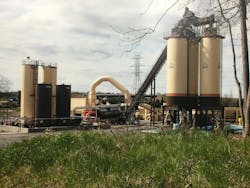We’ve all seen asphalt being poured and smoothed as we slowly drive past road construction and repair projects. And while we’re grumbling about how bad traffic is because of the project, it’s unlikely that many of us gave much thought to the asphalt manufacturing process, much less to the manufacturing operations that produce the asphalt plants themselves. Thanks to Siemens, I recently had the opportunity to see just that during a visit to Astec’s facilities in Chattanooga, Tenn.
Astec is a family of 18 companies involved in the infrastructure, mining, aggregation and energy industries. During the visit to Astec, Malcolm Swanson, president of the company, explained that Astec has nearly 4,000 employees working at 21 manufacturing plants and 12 sales/service facilities. The company was formed in Chattanooga in 1972 and expects $1 billion in revenues in 2015.
Swanson said that Astec is “the dominant asphalt plant manufacturing facility in North America,” with exports comprising about 30 percent of its business. He noted that Astec is also involved in the production of wood pellets for heating uses as well as thermal soil remediation—a business that is getting smaller as the number of sites requiring cleanup services is dwindling. Interestingly, Swanson noted that Astec got into the wood pellet manufacturing business as part of a diversification effort to support Astec’s business as federal infrastructure spending declined.
With some 2.6 million miles of paved road in U.S., 93 percent of which is covered in asphalt, there are about 4,000 asphalt plants in the U.S. employing about 300,000 people. But about half of these plants are very old and need to be upgraded or replaced, Swanson said.
Astec’s core business is the manufacture of hot mix asphalt plants. These plants are built on skids and can be moved or shipped anywhere. Swanson noted that continuous process production methods have become “the preferred method of production for asphalt,” with batch production largely “a thing of the past for this industry.” A key reason for this is that the asphalt mixture has to be maintained between 290-310 degrees to avoid solidifying.
Though the assembly of these asphalt plants is a very manual process, requiring 8-10 weeks, the operation of the plants is highly automated.
One of the key automation technologies in these asphalt plants are variable frequency drives (VFDs). “Siemens VFDs have enabled the development of many Astech technology ideas, especially in our MCC (motor control center) assembly,” said Swanson.
VFDs are important to the warm mix water-foaming method used by Astec that helps reduce the energy needed for making asphalt. For example, the VFD used with Astec’s variable speed drier drum is key to heat transfer in the drum as well as the overall energy efficiency of the burners used to provide the drying heat in the drums.
The drives also play an important role in asphalt pavement recycling. Highlighting the importance of asphalt recycling, Swanson pointed out that the “value of recycled pavement is same as what it replaces, plus it keeps materials out of the landfill.”
Though Astec will build its asphalt plants using whatever automation technology its customers specify, the company has largely standardized on the use of Siemens controllers, drives, and SCADA/HMI systems. “This reduces the opportunity for mistakes while speeding up our assembly process,” Swanson said.
Explaining Astec’s asphalt plant control centers in more detail, Mark Chambers, controls director at Astec, said the company’s hot mix asphalt blending control systems, such as the PMII, PMIII, and TCII, use Siemens Simatic ET 200 distributed I/O, WinCC SCADA systems, and Simocode solid state motor management.
“Our control systems use Profibus or Profinet for networking because of its ease of troubleshooting and fast connections,” said Chambers, who added that Astec is increasingly moving toward standard use of Profinet because of its greater bandwidth capabilities and speed.
Looking forward, Chambers said Astec is looking to start using more intelligent devices, such as real-time moisture probes and more precise data monitoring and logging using Siemens TIA portal. The company is looking to increase its use of automation technologies as it focuses on optimizing energy use in its asphalt plants and reducing waste. “We need very precise control of ingredient flow and the ability to track historical data,” said Chambers. “Moisture control, in particular, is a big issue in asphalt mixing, because moisture levels need to be consistent as materials are added to ensure the resulting batch meets regulated specs.”
Chambers also provided insight into some homebrewed automation projects Astec is working on, such as a “crawlerbot” that can be used to measure the density of asphalt silo walls. Using the crawlerbot eliminates the need for inspection scaffolding and sending workers up into the silo to take measurements manually. The crawlerbot is a small, automated device—much like a remote controlled toy car—that uses brushless AC motors for propulsion and magnetized wheels to adhere to the walls of the silo. Outfitted with a camera, staff on the ground can review the images captured by the crawlerbot’s camera for density measurements.
About the Author
David Greenfield, editor in chief
Editor in Chief

Leaders relevant to this article:

